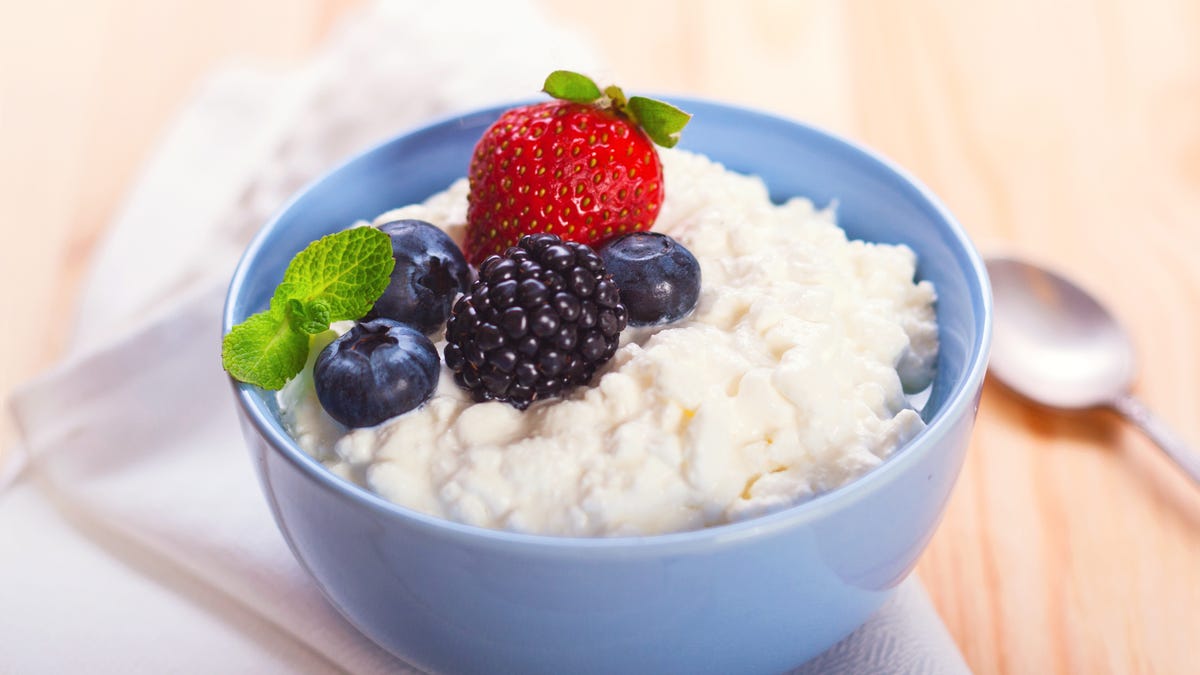
6 signs you might have a vitamin B12 deficiency
Vitamin B12 is essential for producing energy and some research has shown that it can help with depression and prevent dementia.
unbranded – Lifestyle
Once written off as a bland diet food, cottage cheese has become a versatile dairy staple that’s surged in popularity thanks to its creamy texture, high protein content and ability to pair well with both sweet and savory dishes.
You’ll find it piled on toast with fruit and honey at brunch spots, blended into smoothies at health cafes, scooped alongside tomatoes and crackers at summer barbecues and used as a healthier substitute for cream cheese, heavy cream, ricotta and sour cream. “People are incorporating cottage cheese into almost every recipe you can think of,” says Kristen Smith, a registered dietitian nutritionist and spokesperson for the Academy of Nutrition and Dietetics.
But as trendy as it has become, is cottage cheese actually good for you? Here’s what to know.
What is cottage cheese?
Cottage cheese is a fresh, unripened cheese known for its mild and tangy flavor and distinctive curds. It’s made by curdling milk with an acid or enzyme, then “taking the solid parts of the milk (called curds) after they’ve been separated from the liquid part known as whey,” explains Smith. Once this separation occurs, the curds are “drained, rinsed and seasoned with salt” before often being combined with a “creamy dressing” to create the signature texture we associate with cottage cheese, says Kristina Cooke, a California-based licensed nutritionist and registered dietitian.
Its signature lumpiness can vary depending on how the curds are cut and processed. Some varieties feature small curds, while others offer large ones. And sometimes the mixture is whipped together, making a smoother product.
No matter which variety you prefer, Cooke says that freshness is what sets cottage cheese apart from other cheeses like cheddar, mozzarella or brie. Aged cheeses undergo fermentation and drying processes that intensify flavor and extend shelf life, while cottage cheese has a higher moisture content and must be refrigerated to prevent spoilage. While this gives it a shorter shelf life, cottage cheese has the advantage of retaining more water-soluble nutrients and offering a lighter, more delicate flavor.
Is cottage cheese good for you?
Cottage cheese has a lot to offer in terms of health benefits. “Cottage cheese is packed with protein, which helps your body build and fix tissue, keeps you feeling full and supports muscle growth,” says Smith. Indeed, a 1/2-cup serving offers about 12 to 15 grams of protein – and with a tradeoff of less than 100 calories to boot.
Its high protein content, along with being low in calories and carbs, “make cottage cheese an excellent option for people trying to lose weight, build muscle or manage conditions such as type 2 diabetes,” says Shelley Rael, a registered dietitian and nutritionist based in Albuquerque, New Mexico. This is especially true when it’s used as a nutritious substitute for less healthy ingredients, such as replacing mayonnaise in tuna salad, sour cream in dips or creamy dressings atop salads.
Cottage cheese is also high in calcium and phosphorus, “which are key minerals for healthy bones, energy and DNA synthesis,” says Cooke. And it’s a good source of selenium – a powerful antioxidant linked to reduced inflammation and thyroid function; and vitamin B12 – a crucial nutrient for brain health and red blood cell production. “Some types of cottage cheese (those made with live, active cultures) can also give you a boost of probiotics – the good bacteria that help keep your gut healthy,” adds Smith.
Can you eat cottage cheese every day?
While cottage cheese is a healthy food, it isn’t ideal for everyone – or for every meal. One reason is that it contains fat and can be high in sodium. “Some cottage cheese brands can be moderate to high in saturated fat and sodium, which may pose a negative impact on heart health,” says Cooke. Indeed, some commercial varieties contain over 400 milligrams of sodium per 1/2-cup serving – nearly 20% of the recommended daily intake. While everyone should monitor their sodium intake, people with high blood pressure or kidney disease need to be especially mindful. And its fat content “can raise your ‘bad’ LDL cholesterol and increase the chance of heart problems,” says Smith.
And as a dairy product, cottage cheese contains lactose. “This is a type of sugar that can be difficult for some people to digest,” says Smith. Though it contains less lactose than milk, people with lactose intolerance may still experience bloating, cramping or digestive discomfort after eating the cheese.
People with dairy allergies or certain autoimmune conditions may also want to steer clear of cottage cheese, notes Rael, as dairy proteins can trigger inflammation and other reactions in sensitive individuals.
In the end, “cottage cheese is a great way to add protein to sweet or savory dishes without also adding excess calories or fat,” says Cooke. “But if you have elevated cholesterol or blood pressure, consider low-sodium or non-fat options.”
